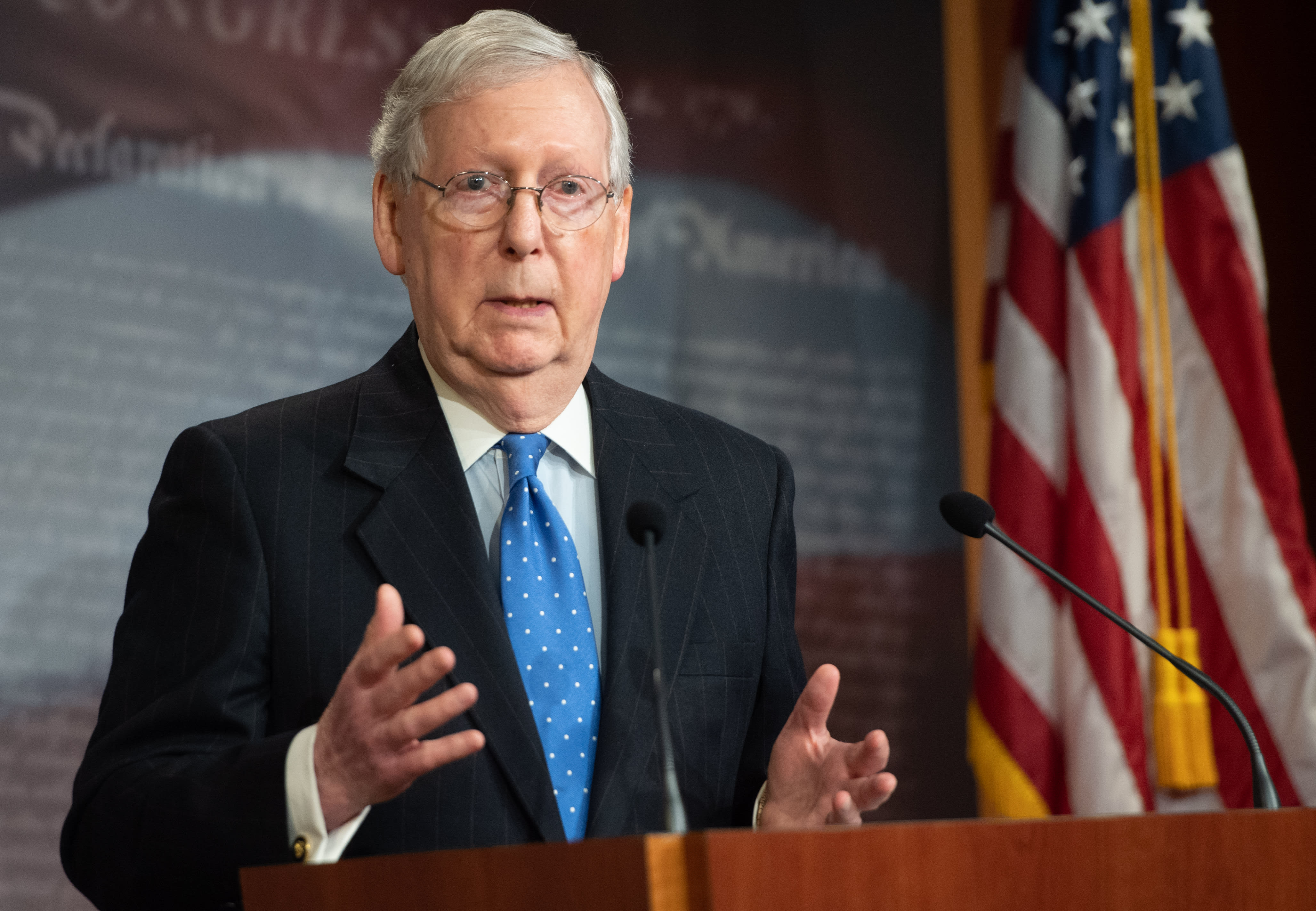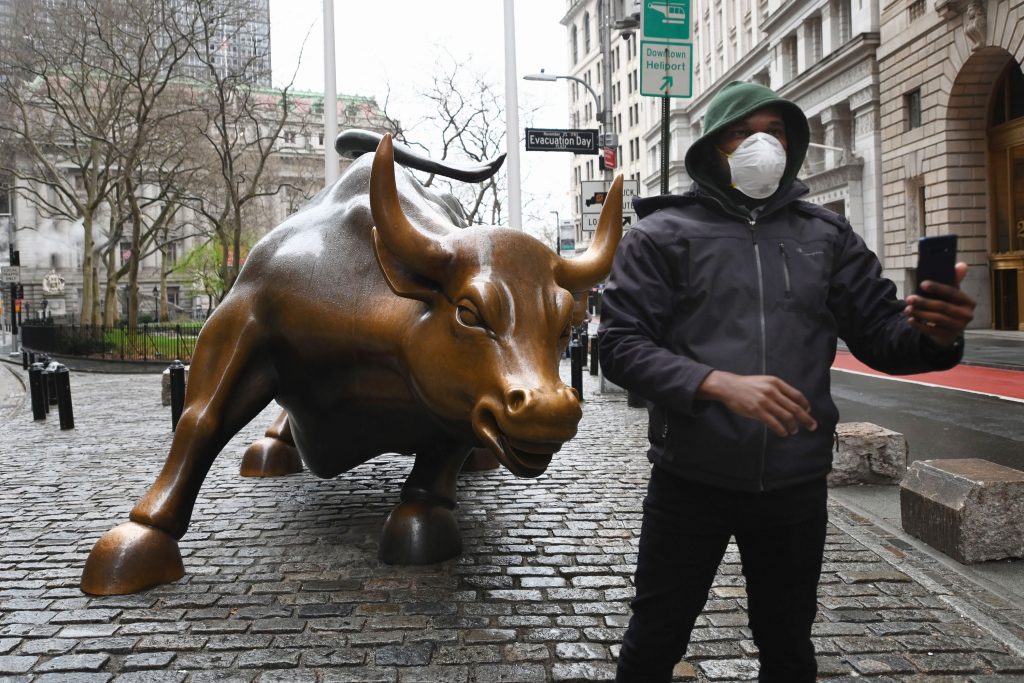
US Senate Majority Leader Mitch McConnell, Republican of Kentucky, holds a press briefing about legislation in response to the novel coronavirus, COVID-19, at the US Capitol in Washington, DC, March 17, 2020.
Saul Loeb | AFP | Getty Images
The White House and Senate leaders reached a deal early Wednesday on a massive $2 trillion coronavirus stimulus bill to combat the economic impact of the outbreak.
“At last we have a deal,” Senate Majority Leader Mitch McConnell said around 1:37 a.m. ET from the floor of the Senate.
The measure has taken on urgency as hospitals, companies, states and individuals have all pled for needed resources to battle the pandemic. Its impact has now seeped into the Senate, with Sen. Rand Paul, R-Ky., earlier this week announcing he has tested positive for coronavirus.
“In effect, this is a war-time level of investment into our nation,” said McConnell, who promised the bill would rush financial assistance to Americans through direct checks to households, enhanced unemployment insurance, hundreds of billions of loans in emergency loans to small businesses, and more resources into hospitals and medical equipment.
The Senate has not yet released the final terms of the deal. An earlier draft of the bill seen Tuesday directed cash payments of up to $1,200 for individuals, $2,400 for married couples and $500 per child, reduced if an individual makes more than $75,000 or a couple makes more than $150,000.
The draft language also stipulated a $350 billion fund for small businesses to mitigate layoffs and support payroll.
McConnell said the bill would “stabilize key national industries” to prevent as many layoffs as possible. U.S. passenger and cargo airlines have sought a total of $58 billion in government relief, to help manage a financial blow they’ve said is worse than 9/11. The details of that aid was one of the last major outstanding issues Tuesday night.
“After 5 days of arduous negotiations, after sleep-deprived nights and marathon negotiating sessions, we have a bipartisan agreement on the largest rescue package in American history. said Senate Minority Leader Chuck Schumer.
He touted “unemployment compensation on steroids,” which would cover every American for four months, as the U.S. braces for historic layoffs and furloughs.
He promised oversight on the loans the U.S. offers businesses, saying “every loan document will be made public very quickly” to make sure those loans are fair. He also said an inspector general and an oversight board would oversee those loans, after earlier criticism from Democrats that a proposed $500 billion fund for businesses left too much discretion to the Treasury.
The deal will allocate $150 billion to states and localities battling the pandemic, and starved of now-delayed tax revenue, he said.
McConnell said the Senate will vote and pass the legislation later Wednesday.
Any deal the GOP-controlled Senate comes to ultimately needs to be passed by the Democratic-led House. It is possible House Speaker Nancy Pelosi, D-Calif., who has been talking with Schumer, could push for more changes to the Senate bill before giving it the go-ahead.
Pelosi said Tuesday morning if the parties can compromise and have “unanimous consent” the bill can move quickly through the House.
“If we don’t have unanimous consent,” she cautioned, “my two options with my members is: we can call them back to vote to amend this bill, or to pass our own bill and then go to conference with that.”
President Donald Trump voiced optimism about the package Tuesday, telling reporters at a briefing of the coronavirus task force “we are working to pass the biggest and boldest financial relief package in American history.”
Stock futures were positive in early Wednesday morning trading, following Tuesday’s historic rally.
Friendlier tone
The day leading up to the talks started, for the large part, on an optimistic note that stood in contrast to the bitter partisanship the took up the Senate floor Monday.
The Senate GOP’s bill failed to clear a key procedural hurdle Monday after a similar result Sunday.
Democrats had accused Republicans of favoring Big Business over workers and healthcare. Republicans said Democrats were causing unnecessary delay by focusing on issues outside the economic crisis facing the country, like giving more bargaining power to unions, increasing fuel emissions standards for airlines, and wind and solar tax credits.
Pelosi rolled out her own House proposal Monday which, though unlikely to become law, further rankled Republicans.
Trump started the day pushing for a deal on Twitter. “Congress must approve the deal, without all of the nonsense, today,” he tweeted Tuesday morning. “The longer it takes, the harder it will be to start up our economy.”
Uncertainty over the deal has rattled markets. Hospitals, workers and individuals have all said they need money now.
Mnuchin and Schumer met six times on Monday, ending on a positive note around midnight. The two picked up negotiations again at 9 a.m. Tuesday.
A bit later in the day, Pelosi told CNBC that there was “real optimism” Congress can clinch a pact within a few hours. McConnell said the bill is at the “five-yard line.”
Just before 11:00 a.m., Mnuchin, Schumer and Rep. Mark Meadows, Trump’s incoming chief of staff, held a meeting in Schumer’s office.
After the meeting, Schumer said on the Senate floor that negotiators were on the “two-yard line.” Issues can be resolved within hours, he added.
While negotiations carried on longer than Schumer forecasted, Kudlow said early Tuesday evening the parties were making “great progress.”
“They’re getting close and closer, they expect a vote as soon as possible,” Kudlow said.
Optimism over the potential deal helped drive the Dow Jones Industrial Average up more than 11% Tuesday, notching its biggest one-day percentage gain since 1933.
Bailout fund
Still, questions around the $500 billion fund remained.
Schumer said Tuesday that Democrats were making “very good progress” in their efforts to add “incentive or mandate” for companies receiving federal loans or grants to keep their employees.
It remains unclear whether the government will demand equity of any of the companies it offers aid to, although lawmakers said the government has considered demanding warrants as part of its airline aid. There has been resistance to equity stakes, which dilute shareholders and give the government stronger oversight, lobbyists have told CNBC.
Boeing CEO David Calhoun told Fox News on Tuesday that if the government “forces” an equity stake, then “we just look at all the other options. And we’ve got plenty of them.”
“It’s just not ideal for us, our suppliers, and all of those companies spread throughout the United States,” he added.
Trump has previously offered his support of the aerospace company, saying “we have to protect Boeing.” He has also said he would consider urging the government to take an equity stake in companies that have bought back stock.
U.S. Secretary of the Treasury Steven Mnuchin walks in a hallway at the U.S. Capitol March 23, 2020 in Washington, DC.
Alex Wong | Getty Images
Airline aid
Lawmakers considered providing at least some of the aid to airlines, among the hardest hit companies from the crisis, in the form of cash grants, according to a person familiar with the matter.
Cash grants would be a victory for airline executives who were pleading with lawmakers to have half of the aid come in the form of cash grants, not just loans, which Republican senators had originally proposed. Labor leaders and executives have argued that saddling companies in debt through loans would make recovery even harder. U.S. airlines employ some 750,000 people.
Carriers have been racing to cut costs, grounding hundreds of planes and asking thousands of workers to take unpaid leave. Airlines are also tapping credit lines to shore up cash to weather the crisis, the impact of which they say is worse than 9/11.
U.S. airlines’ lobbying group, Airlines for America, said the industry would commit to not furlough employees through Aug. 31 if they received grants.
CNBC’s Eamon Javers and Jacob Pramuk contributed to this report.

